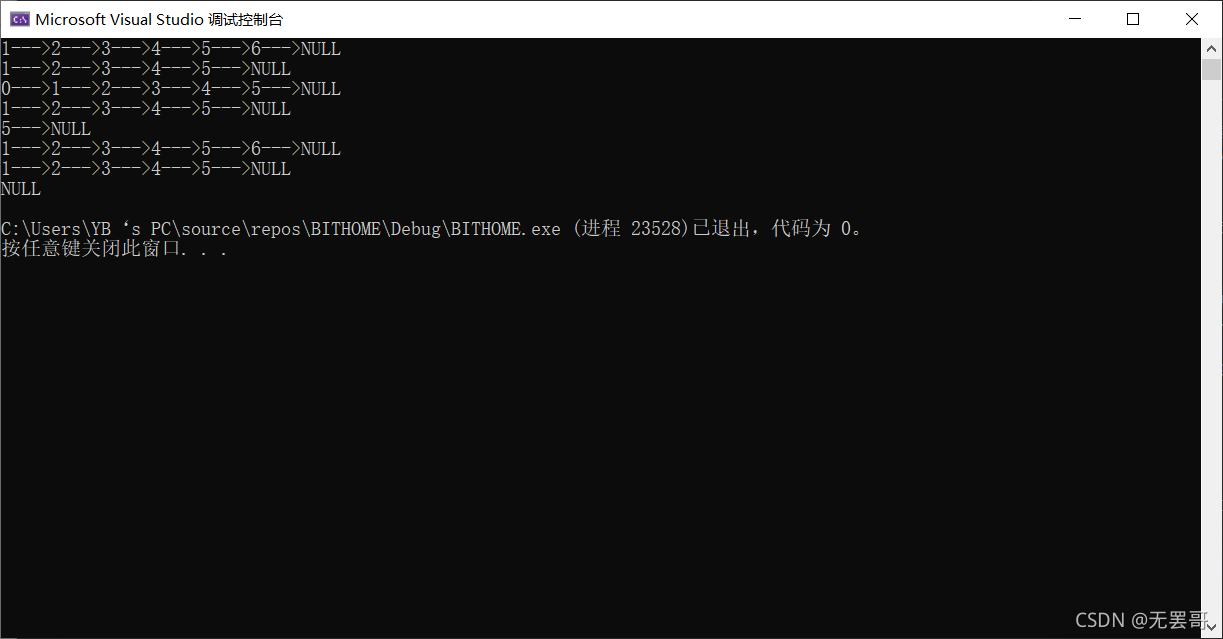什么是单链表?
单链表(Linked List):由各个内存结构通过一个next指针链接在一起组成,每一个内存结构都存在后继内存结构(链尾除外),内存结构由数据域和next指针域组成。

Data 数据 + Next 指针,组成一个单链表的内存结构;第一个内存结构称为 链头,最后一个内存结构称为 链尾;链尾的 Next 指针设置为 NULL (指向空);单链表的方向单一(只能从链头一直遍历到链尾)
单链表的基本操作
单链表的结构体定义
typedef int DataType;
typedef struct ListNode
{
DataType data;
struct ListNode* next;
}ListNode;
创建节点
//动态申请一个节点,赋值X
ListNode* BuyListNode(DataType x) {
ListNode* node = (ListNode*)malloc(sizeof(ListNode));
assert(node);//使用断言检测空间申请失败与否,一搬不会失败,当代计算机的内存足够大几百行的代码一般不会申请失败
node->data = x;
node->next = NULL;
return node;//返回此节点的地址
}
打印链表
//定义一个ListNode型的指针来遍历打印Data值
void ListPrint(ListNode* head) {
ListNode* cur = head;
while (cur) {//当cur走到链表尾时判出
printf("%d--->", cur->data);
cur = cur->next;
}
printf("NULL\n");
}
为什么要使用二级指针?
单链表尾插
ATTENTION:此处函数的参数传了一个二级指针

如图,如果我们不修改head指针的指向时,使用一级指针,可如果我们想修改head的指向时就要使用二级指针,与普通变量类似,若要修改普通变量的值,则需要传入变量的地址,若只是使用变量则传值即可。同理,若要修改head的指向,则需要传入二级指针,若使用一级指针,则只能修改所对应的内存块中的值,却无法修改指针本身的值即指针指向的是哪个内存块。
函数中传递指针,在函数中改变指针的值,就是在改变实参中的数据信息。但是这里改变指针的值实际是指改变指针指向地址的值,因为传递指针就是把指针指向变量的地址传递过来,而不是像值传递一样只是传进来一个实参的拷贝。所以当我们改变指针的值时,实参也改变了。
void ListPushBack(ListNode** head, DataType x) {
assert(head);//检测head是否存在
if (*head == NULL) {//如果链表为空直接申请一个节点地址赋给*head
*head = BuyListNode(x);
}
else {
ListNode* cur = *head;
while (cur->next) {//遍历找到尾节点
cur = cur->next;
}
cur->next= BuyListNode(x);
}
}
单链表尾删
void ListPopBack(ListNode** head) {
assert(head);
if (*head == NULL) {//链表为空
return;
}
else {
if ((*head)->next==NULL ) {//只有一个节点时
*head= NULL;//让头节点指向NULL
free(*head);
}
else {
ListNode* cur = *head;//cur来遍历,prev储存cur前一个节点的地址
ListNode* prev = NULL;
while (cur->next) {//cur走到最后一个节点时判出
prev = cur;
cur = cur->next;
}
prev->next = NULL;
free(cur);
}
}
}
** 单链表头插**
void ListPushFront(ListNode** head, DataType x) {
assert(head);
if (NULL == *head) {//如果链表为空,直接申请一个新节点给head
*head = BuyListNode(x);
}
else {
ListNode* cur = BuyListNode(x);//申请新节点
cur->next = *head;//让新节点成为头
*head = cur;
}
}
单链表头删
void ListPopFront(ListNode** head) {
assert(head);
if (*head == NULL) {//如果链表为空则删除不了
return;
}
else {
ListNode* cur = *head;//让head指向它的下一个节点
*head = (*head)->next;
free(cur);
}
}
单链表查找
ListNode* ListFind(ListNode* head, DataType x) {
assert(head);
if (head == NULL) {
return NULL;
}
else {
ListNode* cur = head;
while (cur) {
if (cur->data == x) {
return cur;
}
cur = cur->next;
}
return NULL;
}
}
单链表在pos之后插入值
void ListInsertAfter(ListNode** pos, DataType x) {
assert(pos);
if (pos == NULL) {
return;
}
ListNode* node = BuyListNode(x);
node->next = (*pos)->next;//申请一个节点指向pos->next,再让pos指向它
(*pos)->next = node;
}
单链表删除pos之后的值
void ListEraseAfter(ListNode** pos) {
assert(pos);
if (*pos == NULL) {
return;
}
else {
if ((*pos)->next == NULL) {//如果是尾节点则删不了
return;
}
ListNode* node = (*pos)->next;
(*pos)->next = node->next;//让pos指向pos的下下个节点
free(node);
}
}
单链表销毁
如果不销毁的话会造成内存泄露
void ListDestory(ListNode** head) {
assert(head);
ListNode* cur = *head;//遍历删除并释放空间
while (cur) {
*head = cur->next;
free(cur);
cur = *head;
}
*head = NULL;
}
完整代码
//"singleList.c"
#include<stdio.h>
#include<malloc.h>
#include "List.h"
#include<assert.h>
//动态申请一个节点,赋值X
ListNode* BuyListNode(DataType x) {
ListNode* node = (ListNode*)malloc(sizeof(ListNode));
assert(node);
node->data = x;
node->next = NULL;
return node;
}
// 单链表销毁
void ListDestory(ListNode** head) {
assert(head);
ListNode* cur = *head;//遍历删除并释放空间
while (cur) {
*head = cur->next;
free(cur);
cur = *head;
}
*head = NULL;
}
// 单链表打印
void ListPrint(ListNode* head) {
ListNode* cur = head;
while (cur) {
printf("%d--->", cur->data);
cur = cur->next;
}
printf("NULL\n");
}
// 单链表尾插
void ListPushBack(ListNode** head, DataType x) {
assert(head);
if (*head == NULL) {
*head = BuyListNode(x);
}
else {
ListNode* cur = *head;
while (cur->next) {
cur = cur->next;
}
cur->next= BuyListNode(x);
}
}
// 单链表尾删
void ListPopBack(ListNode** head) {
assert(head);
if (*head == NULL) {
return;
}
else {
if ((*head)->next==NULL ) {
(*head)->next = NULL;
free(*head);
}
else {
ListNode* cur = *head;
ListNode* prev = NULL;
while (cur->next) {
prev = cur;
cur = cur->next;
}
prev->next = NULL;
free(cur);
}
}
}
// 单链表头插
void ListPushFront(ListNode** head, DataType x) {
assert(head);
if (NULL == *head) {
*head = BuyListNode(x);
}
else {
ListNode* cur = BuyListNode(x);
cur->next = *head;
*head = cur;
}
}
// 单链表头删
void ListPopFront(ListNode** head) {
assert(head);
if (*head == NULL) {
return;
}
else {
ListNode* cur = *head;
*head = (*head)->next;
free(cur);
}
}
// 单链表查找
ListNode* ListFind(ListNode* head, DataType x) {
assert(head);
if (head == NULL) {
return NULL;
}
else {
ListNode* cur = head;
while (cur) {
if (cur->data == x) {
return cur;
}
cur = cur->next;
}
return NULL;
}
}
// 单链表在pos之后插入值
void ListInsertAfter(ListNode** pos, DataType x) {
assert(pos);
if (pos == NULL) {
return;
}
ListNode* node = BuyListNode(x);
node->next = (*pos)->next;
(*pos)->next = node;
}
// 单链表删除pos之后的值
void ListEraseAfter(ListNode** pos) {
assert(pos);
if (*pos == NULL) {
return;
}
else {
if ((*pos)->next == NULL) {
return;
}
ListNode* node = (*pos)->next;
(*pos)->next = node->next;
free(node);
}
}
void test() {
ListNode* head = NULL;
ListPushBack(&head, 1);//尾插
ListPushBack(&head, 2);
ListPushBack(&head, 3);
ListPushBack(&head, 4);
ListPushBack(&head, 5);
ListPushBack(&head, 6);
ListPrint(head);
ListPopBack(&head);//尾删
ListPrint(head);
ListPushFront(&head, 0);//头插
ListPrint(head);
ListPopFront(&head);//头删
ListPrint(head);
ListPrint(ListFind(head, 5));//查找结点
ListNode* pos = ListFind(head, 5);
ListInsertAfter(&pos, 6);//pos位置之后插入
ListPrint(head);
ListEraseAfter(&pos);//删除pos之后的值
ListPrint(head);
ListDestory(&head);//销毁链表
ListPrint(head);
}
//"main.c"
#include "List.h"
int main() {
test();
return 0;
}
//"List.h"
typedef int DataType;
typedef struct ListNode
{
DataType data;
struct ListNode* next;
}ListNode;
// 创建结点.
ListNode* BuyListNode();
// 单链表销毁
void ListDestory(ListNode** pHead);
// 单链表打印
void ListPrint(ListNode* pHead);
// 单链表尾插
void ListPushBack(ListNode** pHead, DataType x);
// 单链表尾删
void ListPopBack(ListNode** pHead);
// 单链表头插
void ListPushFront(ListNode** pHead, DataType x);
// 单链表头删
void ListPopFront(ListNode** pHead);
// 单链表查找
ListNode* ListFind(ListNode* pHead, DataType x);
// 单链表在pos之后插入值
void ListInsertAfter(ListNode** pos, DataType x);
// 单链表删除pos之后的值
void ListEraseAfter(ListNode** pos);
void test();
测试结果
void test() {
ListNode* head = NULL;
ListPushBack(&head, 1);//尾插
ListPushBack(&head, 2);
ListPushBack(&head, 3);
ListPushBack(&head, 4);
ListPushBack(&head, 5);
ListPushBack(&head, 6);
ListPrint(head);
ListPopBack(&head);//尾删
ListPrint(head);
ListPushFront(&head, 0);//头插
ListPrint(head);
ListPopFront(&head);//头删
ListPrint(head);
ListPrint(ListFind(head, 5));//查找结点
ListNode* pos = ListFind(head, 5);
ListInsertAfter(&pos, 6);//pos位置之后插入
ListPrint(head);
ListEraseAfter(&pos);//删除pos之后的值
ListPrint(head);
ListDestory(&head);//销毁链表
ListPrint(head);
}
